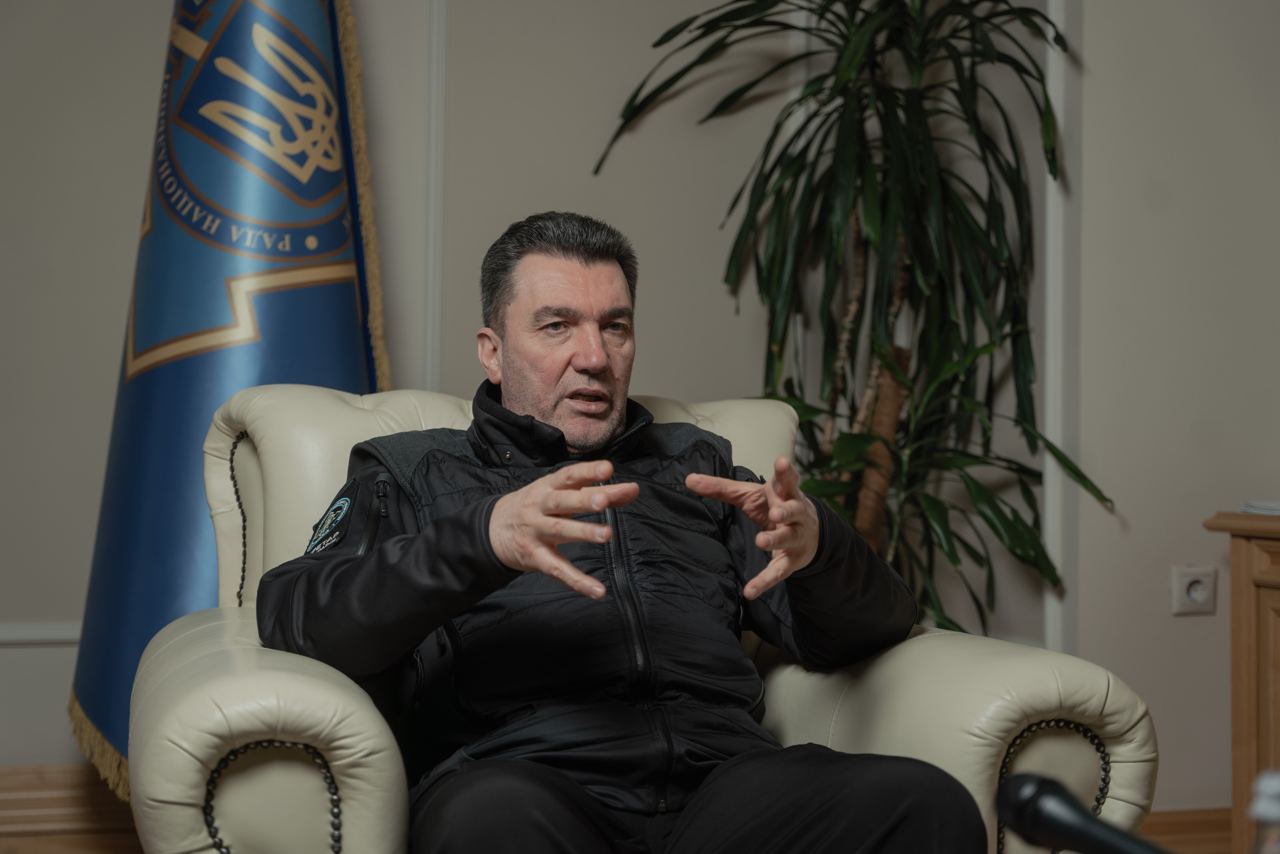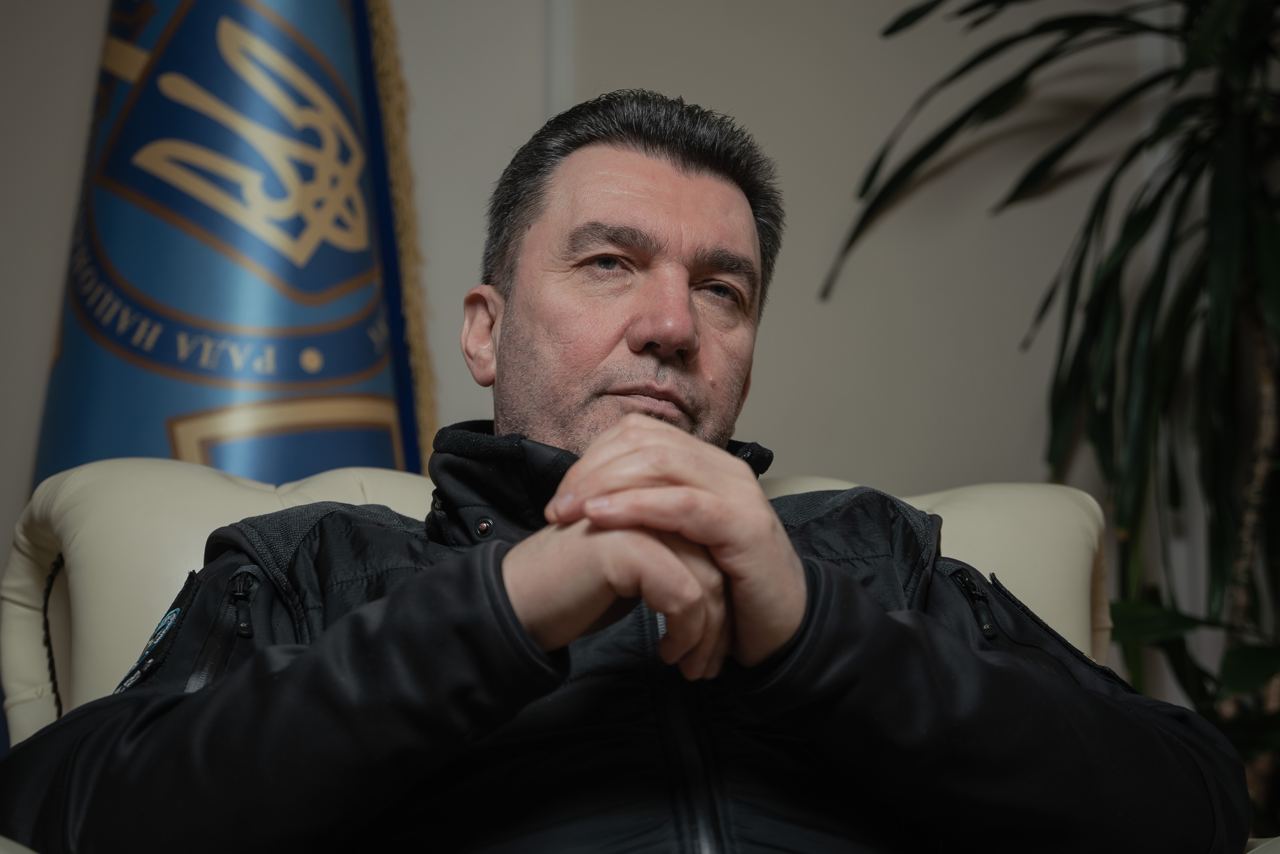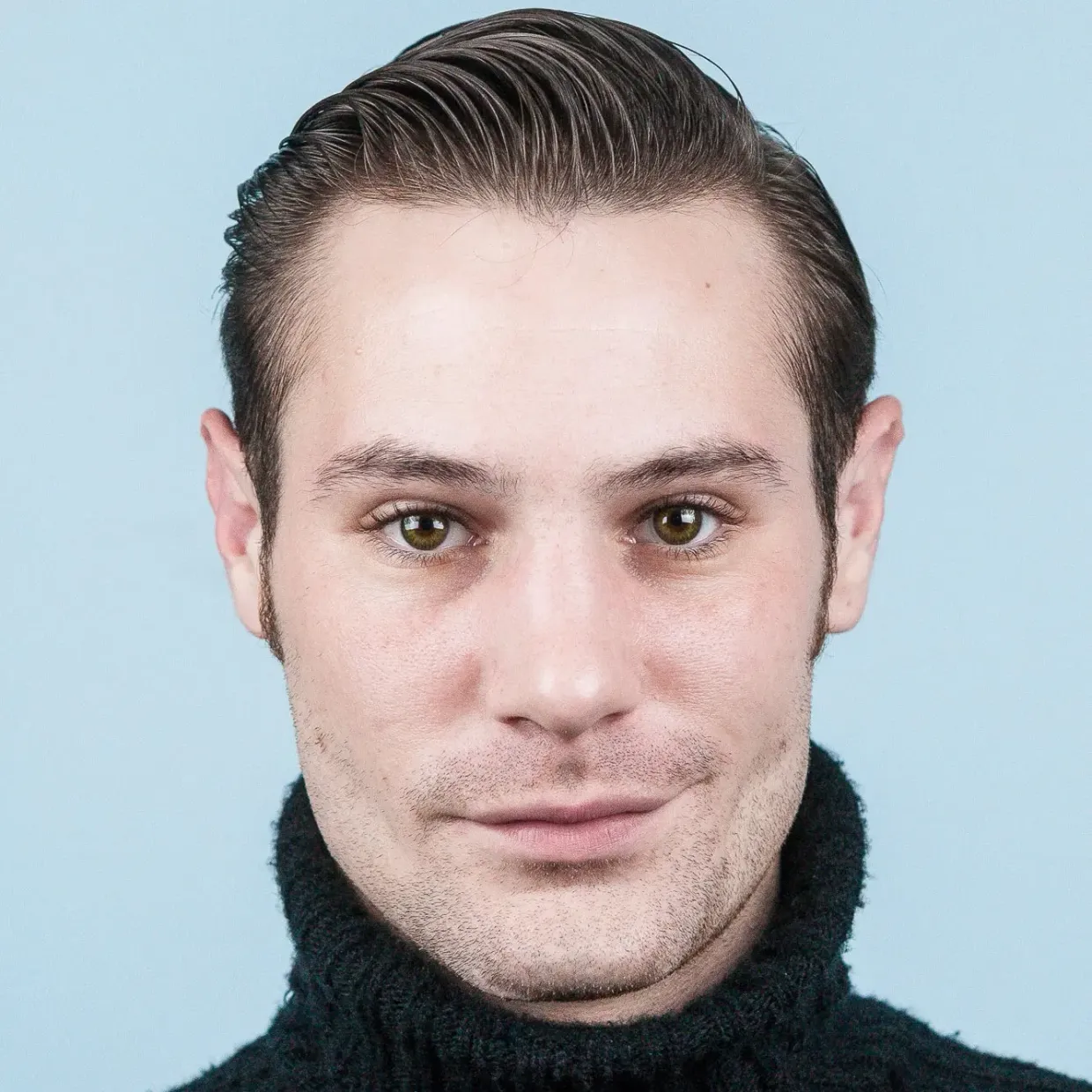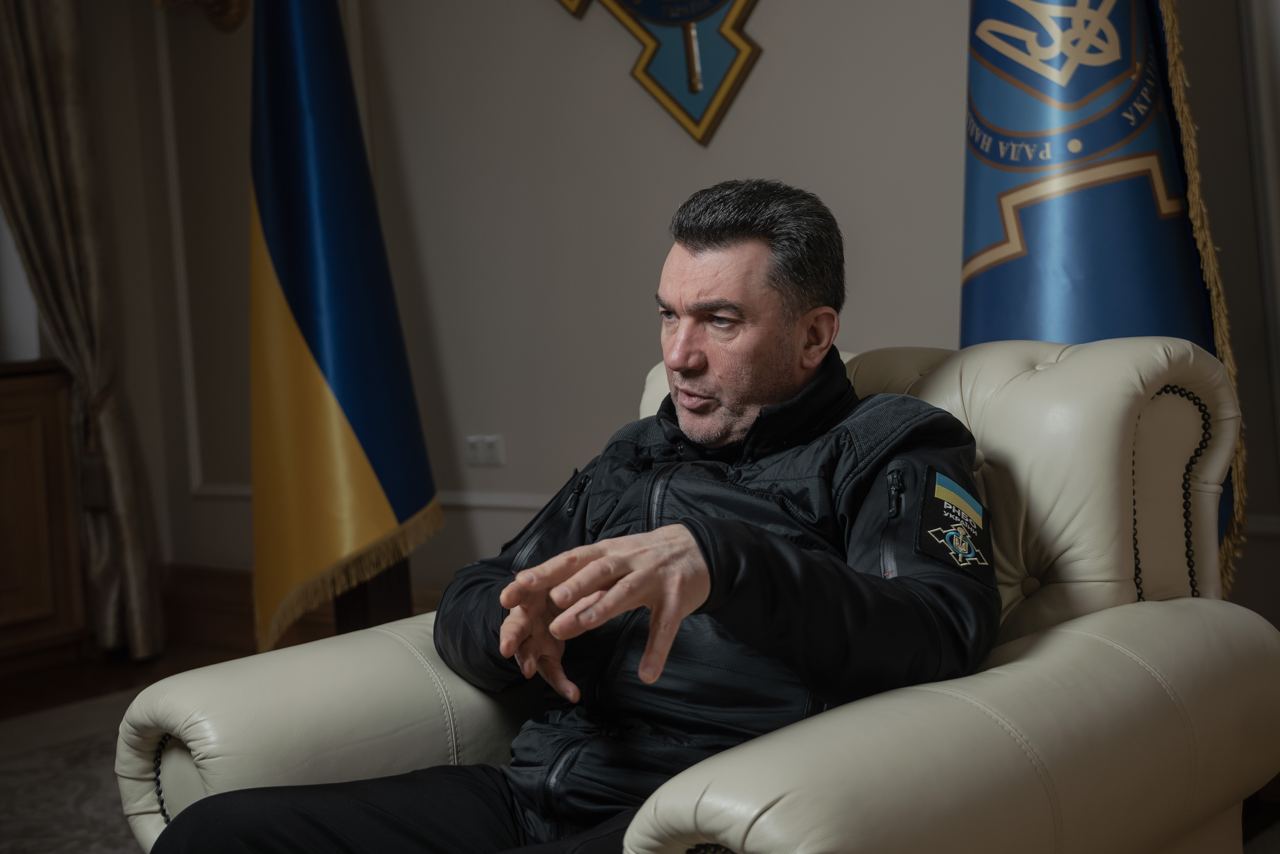Just an hour after Russian bombs began raining down on Ukrainian cities around 4:30 a.m. on Feb. 24, Ukraine’s National Security and Defense Council (NSDC) swiftly imposed martial law nationwide.
The move was understandable in the face of a full-scale invasion. But it also effectively extended the Security Council’s powers to important judicial and economic decisions, now, as a result of the war, considered as tied to national security.
Ukraine’s Security Council has regularly made headlines since Oleksiy Danilov took over as secretary of the previously neglected agency in late 2019.
On paper, the сouncil gathers top officials under President Volodymyr Zelensky’s authority and is a "coordinating state body that implements decisions on security and defense."
But under Danilov's direction, the council has arguably become one of the most powerful tools in the hands of Zelensky – imposing sanctions, stripping individuals of Ukrainian citizenship, and effectively nationalizing private property.
After Russia launched its full-scale invasion of Ukraine, the Security Council has virtually become an unchallenged force.
Experts are torn on the NSDC's mandate, the full extent of its power, and whether it could undermine Ukraine's path to reforms and transparency.
The council has assumed a vast amount of power since the invasion started without being held accountable for its decisions, a law expert from the Center for Economic Strategies, who declined to provide his name, fearing retaliation, told the Kyiv Independent.
"The NSDC substitutes the courts since it has the power to destroy a business, media company, or political party without prosecution and without allowing defense," he said.
The council’s Secretary Danilov dismissed this criticism of the council in a comment to the Kyiv Independent.
"We do not misuse our power," he said. "Our job is to ensure that Russians don’t have spies here and don’t conduct harmful operations aimed at destroying our country."
"We can only restrict something; we do not give orders to shoot people," he said.
Swift decisions
The council has become a body with “unusual powers," Gyunduz Mamedov, a lawyer and former deputy prosecutor general from 2019-2021, told the Kyiv Independent.
In Mamedov’s view, Russia's full-scale aggression gave the NSDC "carte blanche" to extend its powers, which risks "undermining the authority of the judiciary as a whole."
However, Ihor Koliushko, a judicial expert at the Center of Policy and Legal Reform, a Ukrainian think tank, disagrees with Mamedov, saying the powers extended to the council are a matter of national security. According to him, martial law doesn’t give the council powers over juridical matters.
Danilov also dismissed Mamedov’s assessment, saying the council was not trying to bypass the judicial system.
The secretary defended the council's decisions by the need to act quickly in times of war while downplaying the extent of its powers.
One of the most far-reaching of the council’s decisions came on Nov. 6, when it seized five companies associated with the controversial businessmen Ihor Kolomoisky, Kostyantyn Zhevago, Konstantin Grigorishin, and Viacheslav Bohuslaiev. The council invoked special provisions allowed by martial law to confiscate the businesses.
The state took hold of energy companies Ukrnafta, Ukrtatnafta, vehicle maker AvtoKrAZ, transformer producer Zaporizhtransformator, and engine builder Motor Sich. The companies were transferred to the Defense Ministry for as long as martial law is in place.
Danilov downplayed the move, passing off responsibility for the decision to the Supreme Commander's Headquarters, the highest command and control body for the Ukrainian Armed Forces and affiliated agencies.
This body, formed by Zelensky on the day the full-scale invasion started, isn’t that distant from the council. Danilov also happens to be its coordinator.
According to Danilov, the government had to take over these businesses as they are crucially important for keeping the defense sector going during wartime.
Viacheslav Bohuslaiev, turncoat tycoon
The Security Service of Ukraine (SBU) reported on Feb. 1 that Bohuslaiev, president of aviation engine giant Motor Sich, financed Russian proxies in Donetsk Oblast even after the full-scale invasion of Ukraine had started.
Bohuslaiev allegedly paid “taxes and fees” to Russian proxies and cooperated with a company supplying aircraft components for the Russian military. The SBU alleged that Russian-controlled proxies received more than 290 million Russian rubles ($4 million).
According to the investigation, the Russian military used the money to finance offensive operations on the eastern front lines of Russia's war against Ukraine.
Previously, it was reported that Bohuslaiev holds Russian citizenship and owns property in Russia.
"We have the right to make such decisions to meet the needs of the country under martial law," Danilov said. "No need for a conspiracy here — the real question is about the ability to defend the country."
According to Defense Minister Oleksii Reznikov, whose ministry took over the assets, they weren’t nationalized and will be returned to their rightful owners after martial law is lifted.
"If we have to cancel some decisions (of the council) after the war, we will definitely do it to adapt to circumstances," Danilov said.

Blacklist
The NSDC particularly set its sights on Russian assets, seen as a threat to the country's security in wartime.
It regularly imposes sanctions on people and entities deemed to have close links with the Kremlin, which is why putting any people or business on the list can mean a fatal blow to anyone's reputation in Ukraine.
"Initially, the intention was to punish only Russian companies and individuals, but eventually, they started to apply sanctions to national entities allegedly related to Russia," the law expert said.
"There were rumors that this could be used as an instrument of political or business competition," he said.
"And hell broke loose when, apart from Russian companies or local related entities, some random persons and companies started to appear on sanctions lists.”
"A media company I once worked for was accidentally included on a sanctions list of about 1,500 Russian media outlets in 2018" for reporting on Russian-backed militants in Ukraine’s east, the expert said.
As soon as the decision was published, all bank accounts, corporate mobile phones, the website, and all operations with the business register were prohibited for three years.
"They could do nothing about it," he said. "Nothing at all."
Now that the council can strip people of their assets, challenging the council is a daunting task, according to the expert.
"One can go to court, but in fact, there are no positive outcomes," he added.
Ukraine’s Supreme Court has no mandate to process such claims, which leaves people wrongfully sanctioned and powerless to challenge the council's decision.
But Ihor Koliushko, a judicial expert at the Center of Policy and Legal Reform, says the council's powers aren't unlimited and have not changed under martial law as its constitutional status has remained the same.
The NSDC was a relatively toothless tool until Russia invaded Ukraine in 2014, after which then-President Petro Poroshenko signed a law expanding the council's powers in December of the same year.
Under the new law, the council could not only present its proposals to the president but also make decisions on political, economic, military, information, and other issues, as long as it was to protect Ukraine's security in the face of Russian aggression.
Zelensky took it a step further in February 2021 when the council voted to impose sanctions on Viktor Medvedchuk, Ukraine's most high-profile pro-Kremlin politician and Russian President Vladimir Putin's right-hand man in Ukraine. The sanctions included the takeover of Medvedchuk's assets.
Medvedchuk was a co-leader of the Opposition Platform - For Life, a pro-Kremlin party banned in March 2022.
He was charged with high treason and placed under house arrest in 2021, suspected of colluding with the Russian government to extract natural resources in Russian-annexed Crimea along with his ally Taras Kozak.
Later in October 2021, Medvedchuk was charged with treason in a separate case concerning coal supplies to Ukrainian state-owned companies from Russian-occupied areas of Donbas in 2014-2015. Medvedchuk has denied all the allegations.
Medvedchuk was arrested in April after trying to flee Ukraine following the start of Russia’s full-scale invasion. In September, he was handed over to Russia as part of a prisoner exchange.
Through the council, Zelensky also sanctioned in December 2022 leaders and clergy members of the Ukrainian Orthodox Church of the Moscow Patriarchate (UOC-MP), an affiliate of the pro-war Russian Orthodox Church, which was subject to multiple raids by Ukraine's Security Service (SBU).
During these raids, the SBU said it found Russian propaganda and xenophobic literature, Russian passports belonging to senior clergy, and documents with pro-Russian messages on the premises of the UOC-MP.

Hunting ‘oligarchs’
It’s hard not to see the council’s temporary confiscation of assets as tied to Danilov’s main pre-invasion job: the crusade against oligarchs.
Although many Ukrainian tycoons do not check all the boxes of what classifies as an oligarch, the wealthy and influential holding control over the media, industries, and politics has been a pressing issue in Ukraine.
"Such a system is dangerous for the country because people shouldn't monopolize influence," Danilov said.
"When the 'anti-oligarch law' was approved, the (oligarch) system started to collapse," he added.
The anti-oligarch law, adopted in September 2021 and signed in November 2021, was designed to curb the power of oligarchs.
The legislation introduced a legal definition for an oligarch and created a register of those who fell under it. It required officials to declare contact with oligarchs or their representatives.
The bill also prohibits oligarchs from financing political parties, political campaigns, and demonstrations, and prevents them from taking part in the privatization of state assets.
"Today we see that this group of people (oligarchs) doesn't influence politics, economy or the media anymore," Danilov claimed.
Despite the former owners of the five seized companies having dubious reputations and a long trail of criminal proceedings, the decision to place private stakes under the control of the Defense Ministry nonetheless raised eyebrows in the business community.
"Let the prosecutors prosecute him if he's a criminal," Andriy Boytsun, the editor of Ukrainian State-Owned Enterprises Weekly, told the Kyiv Independent at the time.
"That's the proper way to go," he added, saying that expropriating property is bad for business. There are also doubts about the state's ability to develop these assets, he said.
Danilov acknowledged the difficulty of the task in a wartime economy. "It's hard, but we have to develop them," he said. "We live under martial law, which differs much from the free market economy."
However, Mamedov believes such a move puts the council at the center of the judicial system.
"As you can see, during the war, the (council's) voice becomes loudest in those cases where radical measures are needed," he said, referring to cases of treason.
Rule by decree
Compared to a law that must be voted on by parliament and signed by the president, the council works by decree.
A decree is proposed by council members and voted on behind closed doors, after which the president signs it. Some decrees are public presidential decrees, but others are never published.
Decrees that contain personal information or state secrets often go unpublished. The fact that oligarch Kolomoisky was stripped of his Ukrainian passport is widely reported yet not proven, as the decree revoking his citizenship was never made public, and he hasn’t commented on it himself.
Political decisions have to be made quickly in wartime, but not at the expense of a clear and transparent process, according to Mamedov.
For him, the council can't be considered an independent institution because Zelensky chairs it. "The NSDC is сhaired by the president," he said.
"Therefore, it is his ideas and vision that are being implemented."
In other words, Zelensky ultimately holds power over the council.
Since the president is the commander-in-chief and the head of the NSDC, the council indirectly has extended powers now, the law expert said.
The NSDC is not a self-sufficient agency, Koliushko explained, and the president can extend his own political reach.
Yet, Koliushko said the council wasn't a threat to democracy at the moment, although in the wrong hands, its powers could be abused.
After years of Soviet rule, Ukraine strives to perfect its democratic system, but needs more time to have the proper checks and balances, Danilov said.
"We have only begun establishing our democracy, and we can't do everything successfully in just a few years," he added.
Note from the author:
Hello, this is Alexander Query; thank you for reading this story.
I’m incredibly lucky to have been working with the Kyiv Independent team since day one and before, a team that’s working 24/7 to bring you the latest news and in-depth articles to understand the situation in Ukraine and the region.
These are troubled times, but we keep hope, and we will prevail, thanks to our readers. Let us be your eyes and ears on the ground by becoming our patron on Patreon.













